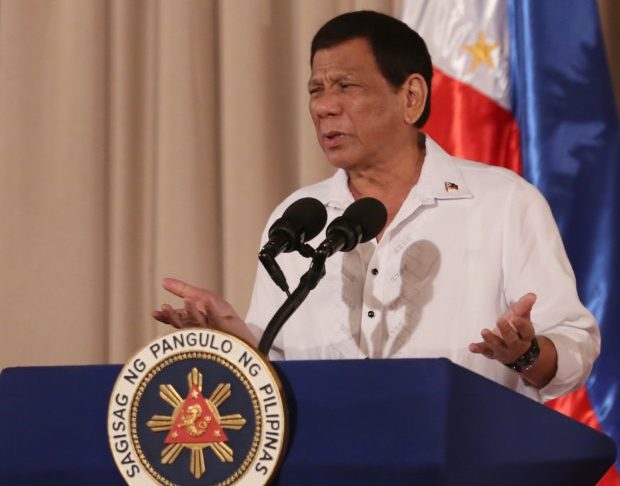
President Rodrigo Duterte. (File photo by JOAN BONDOC / Philippine Daily Inquirer)
President Rodrigo Duterte has called industrialized countries anew to provide assistance to developing nations in their efforts to address climate change.
In his message addressed to the virtual leaders’ summit of the Climate Vulnerable Forum on Thursday, Duterte said that even with the country’s own local initiatives, developed countries should still take up the responsibility to aid vulnerable countries that suffer the brunt of climate-related disasters.
“Climate action and ambition must be shared and demonstrated by all nations,” he said in a statement. “I call on industrialized nations to significantly reduce their carbon emissions and provide assistance to developing nations in terms of finance, capacity building and technology transfers, as urged by the Paris Agreement.”
The Climate Vulnerable Forum is a partnership of 48 nations that are disproportionately affected by a rapidly warming planet. The Philippines chaired the group in 2015, where it oversaw the adoption of the Manila-Paris Declaration, which spelled the concerns and commitments of vulnerable nations.
The President has earlier said that the Paris Agreement, which the country ratified in March 2017, would be a “farce” if developed countries would not be compelled to follow the pact to reduce greenhouse gas emissions and keep global warming to below 2 degrees Celsius above preindustrial levels. He had also blamed Western countries for climate change.
For its part, the Philippines has committed to slash by 70 percent its carbon emissions by 2030, focusing on particular sectors, including energy, industry, forestry, transport and waste.
However, this reduction target was conditional on foreign aid.
At present, the Climate Change Commission (CCC) said it was still reviewing and revisiting the country’s nationally determined contribution (NDC) in reducing greenhouse gases.
Secretary Emmanuel de Guzman, CCC vice chairperson, said that new considerations pushed for a recalculation of targets based on a “cost-benefit analysis.”
“We agreed that we will revisit our submission so that we can also adjust our parameters in terms of growth projections, including economic and population growths,” he said.
While unable to give particular figures, De Guzman said the commission was working closely with the National Economic and Development Authority and the Department of Energy to mainstream the NDC in the country’s Philippine Development Plan.
The government only has a year left, as commitment must be completed before the full implementation of the Paris Agreement in 2020.
Along with other members of the Philippine delegation, De Guzman will head to Katowice, Poland, in December for the 24th Conference of the Parties to the UNFCCC. /jpv
RELATED STORY
Duterte: Paris Agreement ‘a farce’ if big nations won’t adopt it ‘heartily’

